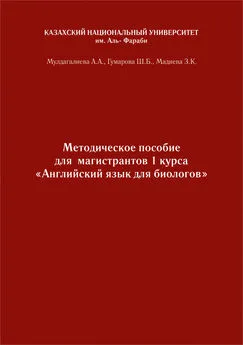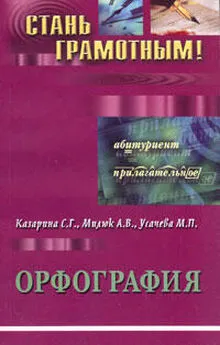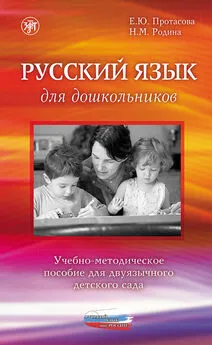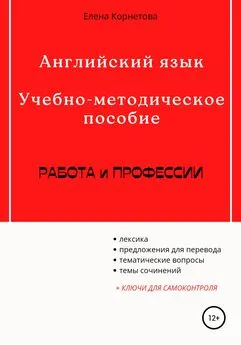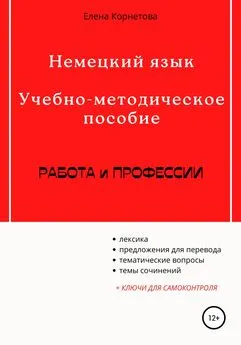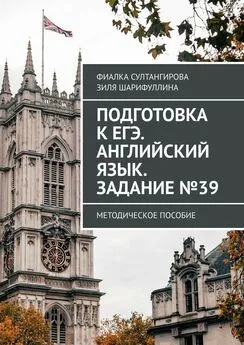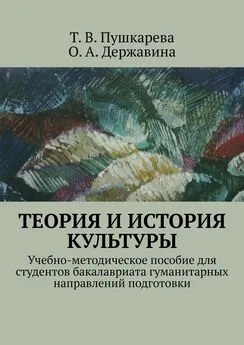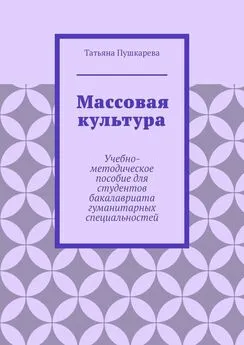З. Мадиева - Английский язык. Учебно-методическое пособие к практическим занятиям для биологов бакалавриата и магистратуры
- Название:Английский язык. Учебно-методическое пособие к практическим занятиям для биологов бакалавриата и магистратуры
- Автор:
- Жанр:
- Издательство:Казахский национальный университет имени аль-Фараби Литагент
- Год:неизвестен
- ISBN:нет данных
- Рейтинг:
- Избранное:Добавить в избранное
-
Отзывы:
-
Ваша оценка:
З. Мадиева - Английский язык. Учебно-методическое пособие к практическим занятиям для биологов бакалавриата и магистратуры краткое содержание
Сборник состоит из адаптированных и оригинальных текстов. Каждый урок включает текст для активной переработки и текст для устного и письменного перевода. Разработан лексико–грамматический материал, серия упражнений к текстам и активный словарь. В конце дан дополнительный материал – оригинальные тексты из английских и американских источников и Интернета для подготовки докладов и написания рефератов. Пособие позволяет приобрести навыки чтения и перевода специальной литературы, усвоить терминологию и развить устную речь.
Английский язык. Учебно-методическое пособие к практическим занятиям для биологов бакалавриата и магистратуры - читать онлайн бесплатно ознакомительный отрывок
Интервал:
Закладка:
In Kazakhstan no mass movement for nature protection exists as it does in western countries, but a few nongovernmental groups are beginning to form and take action. The activities of nongovermental organizations which are occuring in more and more cities around the country raise hopes for improvement of the nature conservation climate in Kazakhstan.
From "Surviving Together", T. Bragina, a scientist worker.EXERCISES:
1. Translate the following into English:
motivate – motivation – unmotivated, occupy – occupation, serious – seriously, economy – economic – economics, attention – attentive – inattentive – attentively, nature – natural, conservation – conservative – conserve, protect – protection, form – formation, act – activity – action, organize – organization, hope – hopeful – hopeless – hopefulness.
2. Find in the text the English equivalents for the following words and word-combinations:
массовое движение, защита природы, западные страны, неправительственные организации, до недавнего времени, ядерные испытания, полигон, огромная территория, климатические зоны, полупустыня, пестициды, оборудование, рыночная экономика, в настоящее время, правительственные структуры, экономические проблемы.
3. Make questions of the following statements and then give short answers to each of them:
1) Kazakhstan occupies an enormous territory.
2) In this varied landscape a great number of species can be found.
3) Kazakhstan"s population is comparatively low.
4) Agricultural cultivation of the steppes forced changes in natural ecosystem.
5) Many natural species are now officially considered rare or endangered.
4. Answer the questions:
1) What species can be found in Kazakhstan?
2) What is the population of Kazakhstan?
3) What climatic zones of our country do you know?
4) What regions of environmental crisis in Kazakhstan are known to you?
5. Read the following sentences and point out the subject and the predicate in each of them:
1) Kazakhstan's biodiversity is seriously threatened.
2) The country's economic crisis had led to a lessening of human impact on natural ecosystems.
3) The largely unregulated transition to a market economy has encouraged extensive commercial use of many plant and animal species.
4) The projects are targeted at regions of environmental crisis.
5) A few nongovermental groups are beginning to take action.
UNIT III
New words and expressions:
salty – соленый
devastate – опустошать
trigger – вызывать
reverse – изменить
unfold – развертывать
basin – бассейн
shrink (shrunk) – садиться, вызывать усадку
irrigation – орошение
reduce – уменьшать
inflow – приток
evaporation – испарение
precipitation – выпадение осадков
estimate – оценивать
encompass – окружать
flow – течение
arise – возникать
saline – соляной
fishery – рыбный промысел
diversity – разнообразие
husbandry – сельское хозяйство
reed – камыш
diminuation – уменьшение
discharge – выделение
expand – расширять
recession – спад
gain – прибыль, прирост
loss – потеря, ущерб
prevent – предупреждать, мешать
surface – поверхность
shallow – мелкий
extend – простираться
drainage – сток
net – сеть, чистый
Read the international words and give their Russian equivalents:
major, history, effect, million, transport, hydrogeological, engineer, decade, problem, planet, serious, tragedy, national, central, fundamentally, balance, natural, hectar, canal, application, reservoir, filtration, system, result, accelerate, block, separate, western, portion, stabilize, kilometer
There are two major environmental disasters in the recent history of the former Soviet Union: Chernobyl and the Aral Sea. In 1960 the land-locked Aral Sea was the world's fourth largest lake, but now, due to increased irrigation demands on its two main inflowing rivers, it is now half the size, 16 m lower and three times as salty. The effect on the 3 mln people who needed the lake for its water, fish and transport has been slowly devastating. Sadly, the huge hydrogeological changes which engineers have unwittingly triggered will take decades to reverse. This paper investigates the nature, causes and consequences of the Aral Sea problem and discusses proposed solutions.
One of the planet's most serious environmental and human tragedies is unfolding in the basin of the Aral Sea. Over the past 40 years, the huge lake has shrunk considerably as expanding irrigation has reduced river inflow to it.
The Aral Sea is located among the deserts of Central Asia. A terminal lake (i.e., without surface inflow ), its level is fundamentally determined by the balance between surface inflow from two large rivers and net evaporation ( i. e. evaporation from its surface minus precipitation on it), which is estimated to be around 874 mm per year. Net ground water exchange plays a secondary role and data on it are approximate.
Five former republics, now independent nations, lie wholly or partially in the sea's basin: Uzbekistan, Kazakstan, Kyrgyzstan, Turkmenistan and Tadzhikistan. The Aral Sea drainage basin encompasses all of Uzbekistan and Tadzhikistan, all but the nothern part of Kyrgyzstan, the eastern half of Turkmenia and the two southern oblasts of Kazakstan. It also includes part of nothern Iran and Afganistan. The flow of the Amu-Dar'ya arises primarily from the Pamir Mountains and the flow of the Syr-Dar'ya primarily from the Tien-Shan Mountains. The population of that part of the Aral Sea basin lying in the former Soviet Union was around 35 mln in 1990.
The Aral Sea was the world's fourth largest lake in the area in 1960. Although somewhat saline the lake was populated mainly by fresh water species and had a productive fishery as well as serving as a major regional transportation route. The vast deltas of Amu-Dar'ya and Syr-Dar'ya not only had major ecological significance, with a diversity of floral and faunal species but great economic importance related to irrigated agriculture and animal husbandry, hunting and trapping, fishing and harvesting of the reeds that grow in abundance in the numerous wetlands and lakes found here.
Over the past 40 years the sea has steadily shrunk. The reason is a huge and growing diminuation of discharge from the Amu-Dar'ya and Syr-Dar'ya, caused primarily by the expanding irrigation in their basins.
Irrigation expantion in the Aral Sea basin after 1960 required much more water per hectar as long canals were extended into the desert; poorer, more saline soils were irrigated, requiring heavier water applications. Giant reservoirs were built that required filling and which increased evaporative losses, and new irrigation systems discharged their water into the deserts rather than back to the rivers.
The net result has been an increasingly large difference between the gain (river inflow) and loss (net evaporation) sides of the sea's water balance. Consequently, the drying, recession and salingation that began in 1960s, accelerated in the 1970s and 1980s and continues into 1990s.
In 1987 the Aral Sea divided into two water bodies: the smaller sea in the north and the larger one in the south. Since then, these have developed as separate water bodies with their own water balances. The Syr-Dar'ya flows into the small sea, whereas the Amu-Dar'ya enters the large sea. A connecting channel existed between the two until mid 1992 when it was blocked by a dike to prevent further water loss from the small to the large sea.
The water body will continue to shrink rapidly because net inflow to it, consisting of surface and subsurface compounds, will remain well below net evaporation. By 2005, when the level falls to 30 m the large sea will separate into a deep western part, which would continue to recede and salinize since it would receive no surface inflow, and a shallow eastern portion which would shrink and salinize less rapidly since it would continue to receive inflow from the Amu-Dar'ya. The eastern part of the large sea would stabilize with an area around 7000 sq km later in the century.
EXERCISES:
1. Translate the following into English:
recede – recession, environment – environmental, serious – seriously, exist – existence – existent – existing, reduce – reduction, fundamental – fundamentally, nature – natural, expand – expansion, extend – extension – extensive – extent, flow – inflow, salty – salt – saline – salinize – salingation- salinity, fish – fishery – fishing, charge – discharge, diminuation – minimum – minimal – minimize, evaporate – evaporation – evaporative, increase – encreasingly, separate – separation, rapid – rapidly, irrigate – irrigation
2. Find in the text the English equivalents for the following words and word-combinations:
огромные гидрогеологические изменения, орошение, требование, впадающие реки, десятилетия, исследовать, последствия, проблема Аральского моря, предложенные решения, пустыни Центральной Азии, уровень, определять, испарение, выпадение осадков, оценивать, второстепенная роль, приблизительные данные, независимые государства, целиком, частично, бассейн Аральского моря, кроме северной части, включать, население, четвертое по величине озеро в мире, рыбный промысел, обширная дельта, разнообразие флоры и фауны, важное экономическое значение, расти в изобилии, многочисленный, за последние 40 лет, пустыня, разделять, с тех пор, насыпь, оставаться.
3. Make questions of the following statements and then give short answers to each of them:
1. The land-locked Aral Sea was the world's fourth largest lake.
2. The Aral Sea is now half the size.
3. The huge lake has shrunk considerably.
4. Expanding irrigation has reduced river inflow to the Aral Sea.
5. The Aral Sea is located among the deserts of Central Asia.
6. Data on net ground water exchange are approximate.
7. Five independent nations lie in the sea's basin.
8. The population of that part of the Aral Sea basin was around 35 mln.
9. The lake was populated mainly by fresh water species.
10. Reeds grow in abundance in the numerous wetlands and lakes.
Читать дальшеИнтервал:
Закладка:
